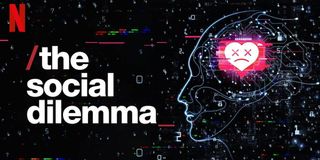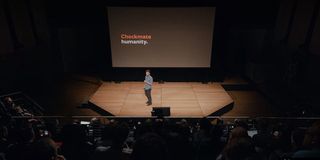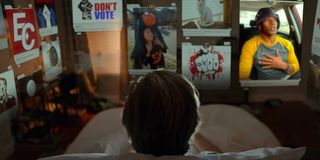What Is The Social Dilemma: 6 Things To Know About The Netflix Documentary Before You Watch

As you have probably heard by now, Netflix recently released a documentary under the name The Social Dilemma that touches on one of the most significant advances in all of human history — the advent of social media. This thought-provoking, interesting, and downright terrifying film will hopefully one day be discussed alongside other pivotal documentaries like Harlan County, USA, An Inconvenient Truth, and Blackfish.
And ever since The Social Dilemma premiered on Netflix near the beginning of September 2020, the documentary has remained in the streaming platform's "Top 10" list, but undoubtedly, there are some people out there who either don't know what it's about or worried about the subject matter. I'll admit, it's a terrifying and sometimes hard to watch 90 minutes, but it's definitely one you shouldn't miss. With that being said, here six things to know about the Netflix documentary before you decide to watch it for yourself.

What The Social Dilemma Is About
Before I got into the nitty-gritty of The Social Dilemma, it is probably best to explain what the documentary is about on a more general level. Okay, the film, which is more a documentary-drama hybrid (more on that in a bit) than anything else examines the various ways social media and social networking companies have manipulated human psychology to rewire the human brain and what it means for society in general. Through a series of interviews with Silicon Valley engineers who designed the technologies they now fear, along with discussions with various tech and psychology experts, The Social Dilemma offers an eye-opening look at a world that so few really understand.

The Documentary Contains Scripted Portions To Further Illustrate The Points It Makes
Throughout The Social Dilemma, various former Facebook, Google, and Apple engineers go into great detail into the ways tech giants are manipulating their users through a range of services (Facebook's "Like" button and notification system, as well as Google Inbox's architecture, come up time and time again), but a lot of the topics and ideas can sometimes be hard to fully grasp.
In order to further illustrate the points that are being made throughout The Social Dilemma, director Jeff Orlowski utilizes a documentary-drama hybrid that features extensive scripted sections centering around a family that has been nearly torn apart because of social media's firm grasp on their attention and need to be connected to the rest of the world even though it means sacrificing meaningful relationships with your loved ones. Things kick up a notch when the son, Ben (Skyler Gisondo) falls into a conspiratorial rabbit hole before being "recommended" even more extreme political videos and even gun advertisements by a representation of Facebook's AI model portrayed by Mad Men's Vincent Kartheiser.

The Social Dilemma Breaks Down How Social Media Companies Take Advantage Of Users, Especially Teenagers
All age groups are discussed in The Social Dilemma, but one of the most striking sections of the documentary is the one that touches on the vulnerability of teenagers who use platforms like Facebook, Snapchat, Instagram, and multiple others every single day and have been molded by social media's influences. This section of the film is highlighted by statistics on depression, anxiety, and even suicide rates of teenagers that correlate with the rise of social media. This is even more striking when the documentary cuts between experts and a dramatization of a depressed teenager portrayed by Sophia Hammons in one of the most masterful performances of the entire dramatic section.

One Of The Documentary's Main Subjects, Tristan Harris, Was Called The Conscience Of Silicon Valley
A lot of what is discussed throughout The Social Dilemma comes from the work of one of the film's main subjects, Tristan Harris, a former design ethicist at Google who later help found the Center for Humane Technology. The crew behind the documentary follows Harris around for a large section of the film while he prepares for a presentation on ways tech and social media companies can avoid practices that sell their users' data to the highest bidder, as well as making their projects less addictive. When Harris was still with Google (on the Google Inbox team), he sent a presentation to several of his colleagues that suggested that the big tech companies (Google included) should take the initiative and prevent a society in which everyone is buried in their phones.
CINEMABLEND NEWSLETTER
Your Daily Blend of Entertainment News
Tristan Harris eventually left Google to focus on creating the Center for Humane Technology (formerly known as Time Well Spent) to help further spread his message about tech giants respecting their users' attention, privacy, and most of all, free will. Shortly after starting his non-profit, Harris was featured in an Atlantic profile that called him the closest thing Silicon Valley has to a conscience. And judging by the way Harris spends much of The Social Dilemma arguing against social media's tight-grip on our psyches, they're probably right.

Be Prepared To Feel The Urge To Deactivate Your Social Accounts
There were multiple times while watching The Social Dilemma where I wanted to get rid of all my social media accounts, turn off my phone, and throw it out the window. And while that's admittedly a little dramatic, the film will more than likely have that same effect on you. When you have tech engineers admitting that their former companies don't really have a full understanding on the artificial intelligences they have built to run platforms like Facebook and Google, you start to feel like you're entering The Terminator or something. It's like we've opened Pandora's box that has been placed behind a floodgate that we can't seem to close.

The Social Dilemma Is Being Called 'Eye Opening' But Is Criticized For Not Offering Solutions
The consensus surrounding The Social Dilemma is that it's one of the most important and consequential documentaries to be released in recent memory. The Chicago Tribune praised the documentary for the manner in which it exposes the damage companies like Facebook, Google, and Twitter have done to society in their need to retain users and gain new ones at the same time. The film is called eye-opening for its in-depth look at social media practices in an ABC News review, explaining that viewers will probably want to throw their phones in the trash before throwing the garbage can through the window of a tech executive.
Despite being praised for its uncovering of nefarious social media practices, The Social Dilemma is being criticized by some for not going far enough and not offering much in terms of solutions for the industry's problems. A CNBC review points out that at the end of it all, few engineers that designed the tools that have changed our psychological makeup offer ways to fix the problem instead of telling the viewer to be more diligent online.
Before I finally decided to press "play" and start The Social Dilemma, I asked myself if it was worth watching and if I should allow myself to get all worked up. And although I was in a "mood" after the credits finally rolled on the documentary, I am glad I ended up learning more about social media platforms that I use every day. It's shocking, sometimes appalling, and frightening throughout, but The Social Dilemma is something you shouldn't skip.

Philip grew up in Louisiana (not New Orleans) before moving to St. Louis after graduating from Louisiana State University-Shreveport. When he's not writing about movies or television, Philip can be found being chased by his three kids, telling his dogs to stop barking at the mailman, or chatting about professional wrestling to his wife. Writing gigs with school newspapers, multiple daily newspapers, and other varied job experiences led him to this point where he actually gets to write about movies, shows, wrestling, and documentaries (which is a huge win in his eyes). If the stars properly align, he will talk about For Love Of The Game being the best baseball movie of all time.
Most Popular






